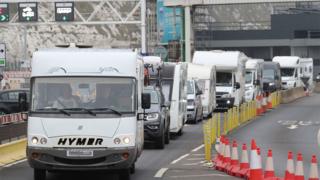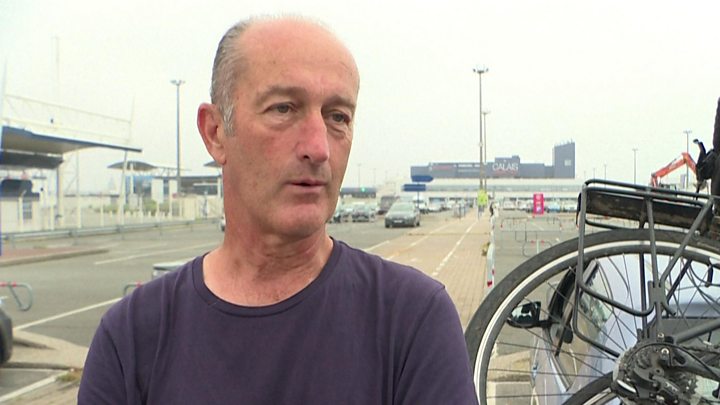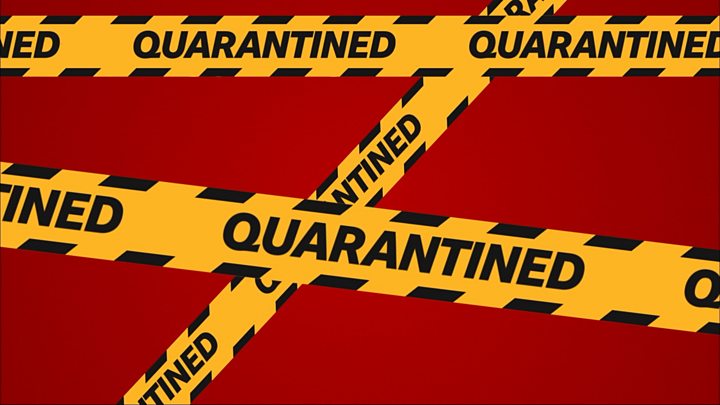 Image copyright
PA Media
Image copyright
PA Media
Thousands of British holidaymakers have made a last-minute dash to get home before a 14-day quarantine requirement came into force for people arriving from France.
The isolation measure also applies to the Netherlands, Monaco, Malta, Turks and Caicos, and Aruba, amid concerns about a rising numbers of Covid cases.
Eurotunnel trains sold out and air fares were up to six times more than normal, but ferries increased capacity.
France warned of "reciprocal measures".
The Netherlands advised against all but essential travel to the UK once the restrictions came into force on Saturday, but it said it will not introduce reciprocal measures.
The countries were targeted for quarantine restrictions because their infections rates exceeded 20 cases per 100,000 people over seven days, Transport Secretary Grant Shapps said.
There were reported to be about 160,000 British holidaymakers in France when the changes were announced, and the deadline left many travellers in a frantic rush for plane, train or ferry tickets costing hundreds of pounds.
Kim Wells and his family were on one of the last ferries to arrive in the UK before the quarantine measures began - getting in to Newhaven from Dieppe in northern France with just eight minutes to spare.
He told BBC Radio 4's Today programme he had a "pretty fraught 40 minutes" online after hearing of the restrictions through a BBC News alert.
"I ended up booking a ferry on a pretty unfashionable route... it was impossible to get back on Eurotunnel, which was the way we went to France originally," he said.
Mr Wells is a teacher and his wife is a local government worker. They felt they should cut their holiday short to avoid having to quarantine as they are key workers.

Media playback is unsupported on your device
Mr Wells said he was frustrated by the short notice the government had given for the rule change, adding: "I completely understand the decision, but I think 30 hours' notice and announcing it at 11 o'clock in the evening French time... was pretty unrealistic.
"I don't really understand why they can't be a little bit more clear with the public about what the tipping point is, when we might perhaps be approaching the need to quarantine... Why not 48 or even 72 [hours] just to allow those who need to or want to get home, get home without rushing dangerously."

Media playback is unsupported on your device
Kate Mooney and her family arrived back at their home in Cornwall at about 01:00 BST after ending their holiday to France a week early.
"Our immediate response was 'let's just stay and finish our holiday', and then we started to really consider what quarantine meant," she told BBC Breakfast.
"There would be no way we could leave the house... that's when we decided we would come back."
Image caption Kate Mooney and her family cut their holiday short by a weekTom Duffell, who runs a small business and ended his family holiday in Nice four days early, told the BBC that social distancing had "gone out of the window" in the scramble for transport, with "huge queues" at the airport.
Eurotunnel, which increased its capacity, said 12,000 people had tried to book tickets for its Channel Tunnel trains in the hour after the new rules were announced - at about 22:00 BST on Thursday - compared with just hundreds normally.
P&O Ferries and DFDS Ferries also added an extra four departures.
Image caption Ferry companies put on extra services to help thousands of Britons make their last-ditch journeys homeSome were unable to get back home in time. One passenger arriving at Gatwick soon after the deadline had passed told BBC Radio 4: "It's ridiculous. They're leaving us high and dry. We tried to change our flights... impossible.
"Me and the kids have been to Cornwall and the Lake District this summer and I don't think that felt any more at risk than where we've been - in a fairly rural part of France."
Another said: "It's a shame to have missed it by such a narrow margin but that's life really, so we've just got to get on with it."
UK 'lagging behind'
Gloria Guevara, president of the World Travel and Tourism Council, said the UK was lagging behind other countries that had "shunned quarantines" in favour of "comprehensive" testing programmes for everyone departing and arriving back into their respective countries.
Shadow home secretary Nick Thomas-Symonds said that while Labour supported "evidence-based measures" at the border, it was "vital" that No 10 had a "joined-up strategy" and "urgently" put in place a specific deal to support the heavily impacted travel sector.
He added: "That the government has still not put in place an effective track, trace and isolate system has made matters far worse and made it more likely that we are reliant on the blunt tool of 14-day quarantine."

Media playback is unsupported on your device
The Foreign Office is now warning against all but essential travel to France.
According to data company Statista, Britons paid 10.35 million visits to France last year, putting it second behind Spain - with 18.12 million - in terms of popularity.
A list of more than 50 so-called travel corridors - allowing movement between the UK and other countries without the need to self-isolate on return - was published at the start of last month and later expanded.
But quarantine measure were later re-imposed on several countries, including Spain on 25 July.
On Friday, France reported 2,846 new coronavirus cases in 24 hours - the highest number since lockdown restrictions were eased. The seven-day average increased to 2,041, marking the first time it has surpassed 2,000 since 20 April, a 66% week-on-week rise.
For the Netherlands, it was up 52%. And the increase for Malta was 105%, while it was 273% for Turks and Caicos and 1,106% for Aruba.
Have you been affected by the recent quarantine changes? Share your experiences by emailing haveyoursay@bbc.co.uk.
Please include a contact number if you are willing to speak to a BBC journalist.

 5 years ago
552
5 years ago
552 

